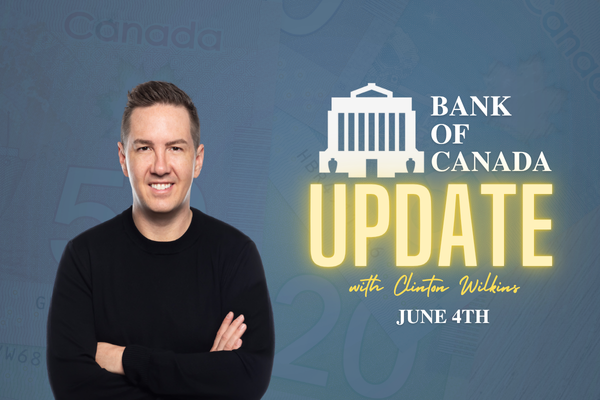Clinton Wilkins joins Todd Veinotte on 95.7 News Radio to discuss The Bank of Canada holding its key policy rate at 2.75%, marking the first pause after seven consecutive cuts.

Clinton Wilkins Special News Update July 19 2024
Clinton joins Todd Veinotte for this special news update on a Toronto news announcement about a potential big drop in prices in the coming months. Clinton gives his take on what that means for Nova Scotians, and gives refinance advice.
Todd Veinotte
All right joining us here in studio, we got a special treat for you. Kind of an unscheduled, impromptu, Clinton Wilkins, chat, Clinton Wilkins. Hello!
Clinton Wilkins
Spur of the moment. Why not? Well, I love coming in. So you can have me anytime.
Todd Veinotte
That’s how you roll. Yeah, as a matter of fact, you’ve gone on the record as saying you’d like to do my job?
Clinton Wilkins
Well, if you ever have a sick day, you know, I put it out there. I’ll just do an open hour for three hours. I’ll have your guests and, we can talk some mortgage lending too, we can just, open up the phone lines, people can start asking me some questions. Why not?
Todd Veinotte
Well, we’ll have to run that by the bar.
Clinton Wilkins
I know. Yeah, we probably have to run that up the flagpole, that might have to go up to Toronto we’re not sure.
Todd Veinotte
All right. So Clinton Wilkins, of course is our mortgage guru. And we co host a show that;s heard twice a month, on our radio station, Mortgage 101. I saw this story, and I thought this is important and this is something that we should get you in to talk about. So I’ll read a bit of it. I saw it on the CTV website.
“With many Canadian homeowners facing a sharp rise in mortgage payments, many of them have decided to bail, resulting in the highest number of Toronto housing units for sale in more than a decade, and signaling a big drop in prices in the coming months.”
What’s your takeaway, first of all on this?
Clinton Wilkins
You know, I do believe that’s the situation in Toronto, and I think it’s probably also the situation and in Vancouver as well. We need to remember that in these markets, people are already very, very indebted. And they’re buying, maybe beyond their affordability. And you know, there was a lot of alternative lending happening there, because people just couldn’t qualify. When B20 and B21 hit, a lot of borrowers that would normally have had a mortgage from the bank, were forced to go to an alt lender or subprime lender to be able to get approved. And those rates were okay, at that time. Maybe 1% or 2% above what a normal customer would get at the bank. But we need to remember, even a regular bank mortgage now is more expensive than they were. A normal mortgage right now, is somewhere around 5%. And a lot of these alternative mortgages are being renewed now at 7% plus. So, it’s making a big difference in terms of people’s affordability. And, I think listing your home, when it comes up for renewal, is not necessarily a bad thing. And I think these people are self-identifying to say, I’m gonna have some financial problems if I just try to hold on. And I just fear that a lot of people do that. They feel like it’s dishonorable to sell your home, or to part with your asset, if you’re not doing the best financially. But, sometimes that’s the best thing you can, do is sell that property. And right now in Halifax, there’s certainly a lot more transactions happening now than there were maybe the last three or six months, because the rates have softened a bit. And, the Bank of Canada is going to be meeting again next week. So obviously we have positive expectations that their rates are going to continue to soften. And a lot of economists think, really, over the next two years, the rates will be 2% less. But, the issue is today. And we need to remember that a lot of borrowers are coming out of very, very low fixed rates. Even bank customers and customers that we deal with every single day. They’re coming out of rates that are sub 2% and going into rates at 5%, for example. The entire payment is not all interest. But, when your interest costs doubles, it certainly makes a big difference. And, here we’re starting to see some rumblings of customers coming up for renewal and selling, but not like what we’re seeing in Ontario. I think the biggest struggle here is if you sell your house, where are you gonna live? And, I think that we need more housing, and some people will sell here, probably over the next two years, just to avoid renewing at a higher rate. And we need more inventory. So, we’re not going to see that huge rush of inventory that they’re seeing in Ontario. And I don’t perceive that our house prices are going to decrease because we just don’t have enough inventory here in Halifax. I read a stat that came out of the Association of Realtors here for last month. The average house price in Halifax was around $588,000. So that certainly continued to increase. Yes, it’s not increasing as fast as it was in the pandemic days, but, home prices are becoming more balanced here, which I’m okay with. And, I think that if some borrowers were to list, when they come up for renewal, I think as long as they have a good exit strategy, and that might just be buying a smaller home, or finding a place to rent. That’s okay, because we have the demand here in our market in Halifax to eat up more supply.
Todd Veinotte
Why not refinance? It is something that people can use, as a tool, if you’ve got the equity.
Clinton Wilkins
Totally! And, we’re seeing a lot of people that are refinancing at renewal to stay in their homes. It’s not necessarily refinancing to pull equity, Todd. That’s what you normally think of when somebody goes to do a refinance; you think they’re gonna do a renovation or maybe add a home equity line of credit, or pay off some consumer debt. But that’s not always the case. Right now we’re seeing a lot of people that are refinancing or or changing lenders, for example, just to extend the amortization. And it’s not extending amortization forever. But a lot of borrowers are going to a 25 or 30 year amortization, just for this term, taking no equity, to lower their monthly output. And I hear from borrowers every day, people are stressed, and people are waiting to the very last minute before renewal. I’m seeing so many people that are renewing, in four weeks. Let’s deal with the problem early, it’s not enough time. And, some of these borrowers, we have to get to renew into an open term. And let me tell you, an open rate now folks, it’s like 9-10% to be in an open. So you want to avoid being in an open term, obviously, if you can. But, deal with your problems early. 120 days before renewal is really when you need to start thinking about this. Are you going to do a straight renewal with your lender? Are you going to look to transfer to another lender and hopefully get a better deal? Because, you know, mortgage lenders typically treat new customers better than existing. Are you going to do a refinance? Or, does selling make the most sense? And I think it’s a great time, when you come up for renewal, to really think about your personal finances. And look at all of that, you know, there’s been so many changes over the last couple of years that people’s needs have changed there, their whole outlook has changed. So I think it’s a good time to look at that at renewal. And sometimes it can just be a reset, and it might not be a reset forever. And there’s such a negative connotation to extending amortizations. But if that’s what it takes to keep somebody in their home, and prevent them from having financial hardship, or prevent them from borrowing on a line of credit or a credit card to live, I’m all about it. Let’s extend those amortizations. You know, it kind of brings up a really good point, Todd, we see people going into retirement all the time. And, I was always taught, “you really need to have your mortgage paid off by the time you retire, because how can you have a good retirement?” But, I think that mentality is changing. Because the home is typically the biggest asset that a household has, or family has. And leveraging that asset can really help with retirement. You know, not everybody has a pension these days, some people are living off CPP and OAS. And I think leveraging that home, even with a reasonable payment, maybe it’s $1,000, $1,500, or $2,000, you can’t rent for that amount now. So, I think this notion of paying off the home before retirement is going away for a lot of borrowers. And we’re even seeing people going into retirement, that are really leveraging their properties to either better their situation, supplement their retirement. And they’re okay with it. Because they’re like, I’m okay with this mortgage, because I would pay this for rent, and I get to stay in the home that I want to be in the community that I want to be.
Todd Veinotte
You’re all about the advice, and that’s great. Serving the community in a good way. Your advice is to get on it, act early. Because, I mean, if you got four weeks, the documents that you need to get together, all of that stuff. I mean, it’s summer, people are on vacation, get on the ball!
Clinton Wilkins
Totally get on the ball, I think four months prior, is the right time. You know, and I think seek the advice of an unbiased mortgage professional, even if that’s not who you dealt with for the mortgage, that you have. So many differences out there. And I hear borrowers that will walk into their bank branch and say, “well, my branch won’t extend my amortization.” Well, yeah, they want to make the maximum amount off of you. And, if you’re not borrowing more money, there’s no motivation for them to necessarily rework your existing situation. So sometimes you need to leave the lender that you’re with to get what you want. And that’s okay. You know, mortgage brokers deal with all kinds of bank lenders, federally regulated lenders, some that are broker only. And we also deal with lenders, for those borrowers who can’t qualify for a normal, bank style, mortgage. That’s okay! We’re always about making a plan because, nothing’s forever, and everybody’s situation is different. And, sometimes you just need a year, or two years, or three years in the situation, and then get into a better situation. And that’s where I think the advice piece is so important, and you need to have someone that’s going to watch it. Finance is not taught in high schools. People don’t have any idea really how a mortgage works. It’s virtual. It’s so in the sky, you don’t touch and feel your mortgage. But it’s important to seek the advice of someone that really does this every day.
Todd Veinotte
Okay, just got an email from Doug it says, ask Clinton if it makes sense to refinance to pay for a HELOC.
Clinton Wilkins
I am 100% about that all the time. I think HELOCs, in some cases if they’re not managed well, it’s a forever plan. This is a home equity line of credit. So, there are borrowers that have just a Home Equity Line of credit on their home. Currently, the federal government allows lenders to go up to 65% of the market value for a home equity line of credit. And it is typically a forever plan for a lot of people. You know, the rates could be anywhere from prime to prime plus one, just depending on the lender and your circumstance. But typically, they’re an interest only payment. And borrowers by and large will pay the minimum payment. It’s tough sometimes to part with that, you know, the principal. And it doesn’t force people to pay it down. So oftentimes, we’ll see borrowers that are in a HELOC type product, and then will take it out into a standalone mortgage, even at a 30 year amortization. The payments are not that much more, but at least they’re starting to pay down some principal because you’re getting a much lower rate with a mortgage than you are with a home equity line of credit.
Todd Veinotte
All right. And reverse mortgages is something that people talk a lot about, it’s advertised, a lot of marketing around this. What advice do you give people when it comes to a reverse mortgage?
Clinton Wilkins
If you’re 65 years old, a reverse mortgage is probably not working for you. If you’re 80 years old, giddy up! And, it depends if you’re a man or woman, because there’s different stats on how long you’re gonna live. And it depends if there’s two people on the application or not. It depends on where the property is. But typically, for example, Chip, that’s one of the ones that we deal with; they will lend a very small percentage of that property value. When borrowers come to see me, typically in retirement, because that’s who would be getting a reverse mortgage, sometimes a home equity line of credit makes more sense. Depending on their situation, and if they can qualify, and how their credit is. A chip mortgage is better, sometimes for people that need to supplement their income, or their income is very low, or their credit is maybe not that good, or they’re very, very old. Because the older there they are, the more a company like chip will lend to you.
Todd Veinotte
And of course, if you’ve got dependents and kids that you would like to pass on, its maybe a different situation. That needs to be considered as well. Again, so many layers to mortgage lending!
Clinton Wilkins
It’s complex. It’s the most regulated industry, really, in banking and in finance. We dot every T, cross every I, and literally every single piece of paper is audited. There’s many eyes on that paper. And it’s really that the federal government is trying to protect borrowers from themselves and protect the banks. And we’re all about that, too. But there are a lot of nuances and differences between lenders. And it’s not just a rate. And, I think there’s so many misconceptions that the lowest rate is always the best rate. It’s not. You really need to figure out, what is your game plan? And, where are you going in your life, because, depending on your situation, the advice really is different. And the advice changes, Todd, honestly. Let me tell you, we have never done so many variable rate mortgages, as we have the last two or three months. People are coming and knockin for variable now. And I expect, once next Wednesday hits, and there’s some news from the Bank of Canada, and if they continue to cut that key overnight rate, the variable rate mortgages will look much more attractive, I think, than fixed.
Todd Veinotte
Alright Clinton, thanks for coming in I appreciate pal.
Clinton Wilkins
Thanks for having me, Todd. Happy Friday,


